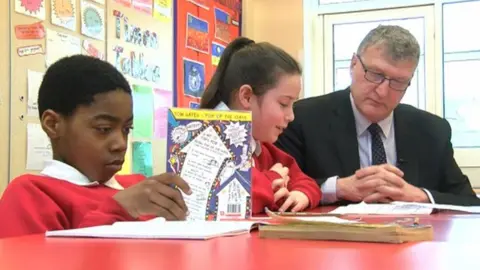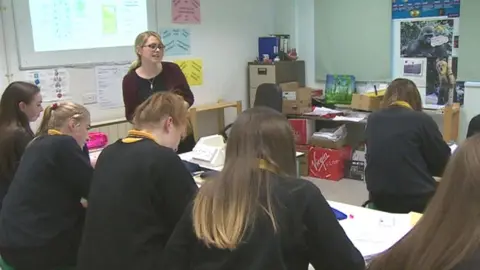'Quiet crisis' over school funding warning from heads
Head teachers have spoken of a "quiet crisis" facing Welsh schools due to a lack of funding.
There is a warning that financial pressures could already be damaging standards through bigger classes and staff teaching multiple subjects.
Meanwhile, Estyn has warned it could undermine the ability of heads to introduce the new curriculum in 2022.
The Welsh Government said it was prioritising funding to councils to ensure it reached frontline schools.
As next year's budgets are being finalised, BBC Wales has also been told further school job losses are likely.
Neil Foden, head teacher of Ysgol Friars in Bangor, in Gwynedd, and national executive member with the National Education Union (NEU), said: "When there's a crisis in the health service, it's very, very visible and often high profile.

"Pictures of ambulances queuing up outside A&E departments are something people have become sadly familiar with, but there's a quiet crisis in education."
Other heads are concerned about inconsistency with funding across different parts of Wales.
Michael Davies, head of Ysgol y Preseli at Crymych, Pembrokeshire, said he was looking at deeper cuts than ever before, including GCSE courses and partnerships with local colleges.
"We've cut everything down to the bone - and now unfortunately we're having to look at cutting that most important resource of all, which is the teaching staff and support staff."

Lyndon Watkins, head of St Mary's RC primary school in Bridgend but currently seconded to a school in Cardiff, said schools had been suffering since the financial crisis.
He said the Bridgend school's funding this year was the same as it received six years ago, while costs had gone up and he had already had to make a redundancy.

You might also want to read:

Mr Foden said primary schools had started looking at using unqualified staff to cover for planning, preparation and assessment time (PPA) - about 10% of the timetable.
"I'm sure if parents realised that for the equivalent of one month for every academic year their children were effectively child-minded, not taught there would be a real crisis, but they don't know," he said.
"People don't see that the teacher in front of the class hasn't had any experience of that subject maybe for 10 or 15 years - and that was when they did A-levels in that subject."
"So it's a hidden crisis and I think it's only at a point when we see a real dip in standards, as measured by examination results or parents start to realise that their children are increasingly in classes of 32, 33, 34 or 35, that it will come apparent."
Meilyr Rowlands, the chief inspector at educations watchdog, Estyn, told a committee of AMs on Wednesday that they should be incredibly wary that the workload is not too great for head teachers while rolling out the new curriculum over the next four years.
When asked by Plaid AM Llyr Huws Gruffydd if he shared the concerns that shrinking schools budgets would intensify those dangers, Mr Rowlands said: "Yes, I would," before adding that it takes time and effort for heads to deal with cuts.
BBC Wales also asked Welsh councils about levels of school deficits:
- Bridgend has projected 26 schools - more than half - will have deficits by April amounting to almost £1.2m
- Powys reports 38 of its schools are projected to be in deficit during the same period with cumulative balances totalling £2.48m
- The latest figures from Cardiff council said 11 schools were in deficit last year, with one school £1.6m in the red
- Flintshire has had seven of its 12 secondary schools in deficit going into this financial year
- Pembrokeshire said 15 primary and four secondary schools were projected to be in deficit at the end of March
It is already known that the overall level of reserves held by schools in Wales has also been falling. It was £46m in the last financial year, the equivalent of £102 per pupil.
Ministers believe some schools are still maintaining high balances and are challenging councils to ensure schools are making good use of funding.
Mr Foden knows of more than 30 schools in Gwynedd with balances of less than £10,000 and of 25 schools which have started the redundancy process.
Anglesey had the highest level of reserves per pupil at £223 while Denbighshire had the lowest with a deficit of £70 per pupil. In Powys, reserves were £2 per pupil.
'Continued austerity'
Myfanwy Alexander, cabinet member for education at Powys council, said the rural nature of the county meant it cost more to transport children, with every penny coming out of school budgets.
The Welsh Government said school funding was the responsibility of local councils and it was important to recognise that "not a single Welsh local authority faces a reduction of more than 0.5% in their core funding next year".
A spokesman said action had been taken to prioritise funding to local government to ensure resources "go straight to the front line to support school spending".
He added: "We recognise the strain the UK government's continued austerity agenda is putting on our public services, which is why only last week the education secretary announced an additional £14m to be directed straight to the front line to support every school across Wales.
"As a government, we will continue to prioritise school funding."
Conservative education spokesman Darren Millar said there could be "no excuse" for the Welsh Government's "failure" to properly fund schools.
"For every pound spent on schools in England, the Welsh Government receives £1.20 to spend here - yet in spite of this, pupils in Wales attract almost £700 each less in spending than those over the border."
"It's a national scandal, and little wonder that Wales' education system is at the bottom of the UK league table and languishing in the bottom half of international rankings."
